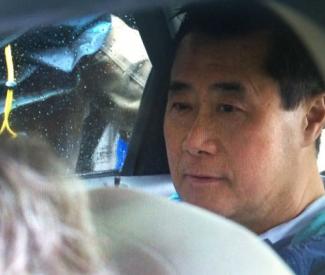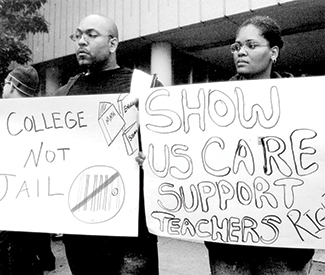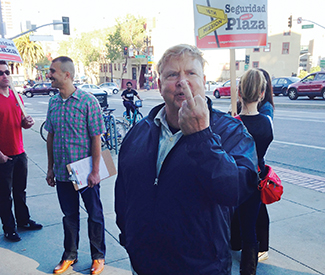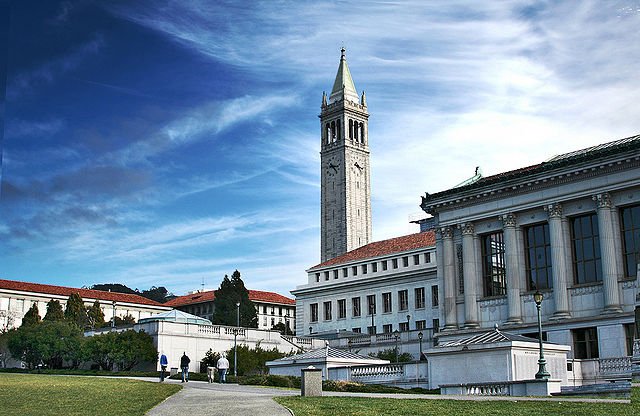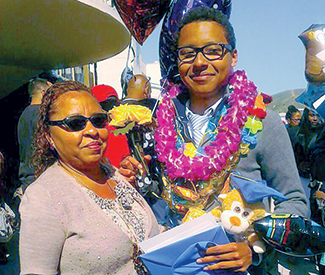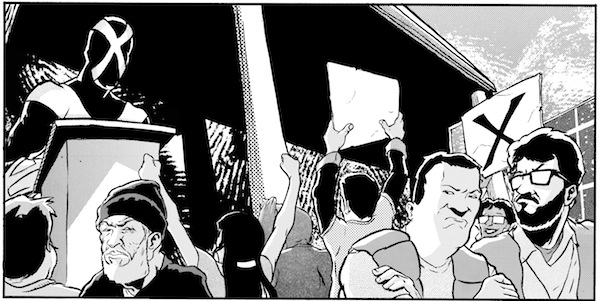WEDNESDAY 19
ROCK
Bottom of the Hill: 1233 17th St., San Francisco. Yellow Ostrich, Pattern Is Movement, Paint the Trees White, 9pm, $12-$14.
Brick & Mortar Music Hall: 1710 Mission, San Francisco. Thumpers, Solwave, 9pm, $10.
The Chapel: 777 Valencia, San Francisco. Sam Roberts Band, Kris Orlowski, 9pm, $15-$18.
Hemlock Tavern: 1131 Polk, San Francisco. Hellbeard, Serial Hawk, Sludgebucket, 8:30pm, $7.
The Knockout: 3223 Mission, San Francisco. Terra Moans, The Krypters, My Name Is Joe, 9:30pm, $6.
Slim’s: 333 11th St., San Francisco. Me First & The Gimme Gimmes, La Plebe, The Joey Show, DJ Big Nate, 9pm, sold out.
Thee Parkside: 1600 17th St., San Francisco. Spirit Caravan, Pilgrim, Waxy, 8pm, $15.
DANCE
Beaux: 2344 Market, San Francisco. “BroMance: A Night Out for the Fellas,” 9pm, free.
The Cafe: 2369 Market, San Francisco. “Sticky Wednesdays,” w/ DJ Mark Andrus, 8pm, free.
Club X: 715 Harrison, San Francisco. “Electro Pop Rocks: EPR’s Spring Break,” 18+ dance night with Frank Nitty, D Menis, DJ Audio1, more, 9pm
DNA Lounge: 375 11th St., San Francisco. Go Chic, Blok, Violent Vickie, 9pm, $10-$12.
F8: 1192 Folsom, San Francisco. “Housepitality,” w/ Kenneth Scott, Max Gardner, Sean Murray, Tony Watson, 9pm, $5-$10.
Infusion Lounge: 124 Ellis, San Francisco. “Indulgence,” 10pm
Lookout: 3600 16th St., San Francisco. “What?,” w/ resident DJ Tisdale and guests, 7pm, free.
Madrone Art Bar: 500 Divisadero, San Francisco. “Rock the Spot,” 9pm, free.
Make-Out Room: 3225 22nd St., San Francisco. “Burn Down the Disco,” w/ DJs 2shy-shy & Melt w/U, Third Wednesday of every month, 9pm, free.
MatrixFillmore: 3138 Fillmore, San Francisco. “Reload,” w/ DJ Big Bad Bruce, 10pm, free.
Q Bar: 456 Castro, San Francisco. “Booty Call,” w/ Juanita More, Joshua J, guests, 9pm, $3.
Showdown: 10 Sixth St., San Francisco. “Nokturnal,” w/ DJs Coyle & Gonya, Third Wednesday of every month, 9pm, free.
HIP-HOP
Neck of the Woods: 406 Clement, San Francisco. “Over the Hump,” w/ Children of the Funk, 10pm, free.
Skylark Bar: 3089 16th St., San Francisco. “Mixtape Wednesday,” w/ resident DJs Strategy, Junot, Herb Digs, & guests, 9pm, $5.
ACOUSTIC
Cafe Divine: 1600 Stockton, San Francisco. Craig Ventresco & Meredith Axelrod, 7pm, free.
Hotel Utah: 500 Fourth St., San Francisco. Jeb Havens & Tawnee Kendall, Lee Aulson, 8pm, $10.
Plough & Stars: 116 Clement, San Francisco. Michael Mullen, 9pm
The Rite Spot Cafe: 2099 Folsom, San Francisco. Goh Nakamura, 9pm, free.
JAZZ
Balancoire: 2565 Mission, San Francisco. “Cat’s Corner,” 9pm, $10.
Burritt Room: 417 Stockton St., San Francisco. Terry Disley’s Rocking Jazz Trio, 6pm, free.
Cigar Bar & Grill: 850 Montgomery, San Francisco. Jack Mosbacher Duo, 8pm
Club Deluxe: 1511 Haight, San Francisco. Patrick Wolff Quartet, 9pm, free.
Le Colonial: 20 Cosmo, San Francisco. The Cosmo Alleycats featuring Ms. Emily Wade Adams, 7pm, free.
Sheba Piano Lounge: 1419 Fillmore, San Francisco. Fran Sholly, 8pm
Top of the Mark: One Nob Hill, 999 California, San Francisco. Ricardo Scales, Wednesdays, 6:30-11:30pm, $5.
Yoshi’s San Francisco: 1330 Fillmore, San Francisco. Four80East, Matt Marshak & Marcus Anderson, 8pm, $21.
Zingari: 501 Post, San Francisco. Chris Duggan, 7:30pm, free.
INTERNATIONAL
Bissap Baobab: 3372 19th St., San Francisco. “Baobab!,” timba dance party with DJ WaltDigz, 10pm, $5.
Cafe Cocomo: 650 Indiana, San Francisco. “Bachatalicious,” w/ DJs Good Sho & Rodney, 7pm, $5-$10.
The Independent: 628 Divisadero, San Francisco. Ana Tijoux, Kumbia Queers, Como Asesinar a Felipe, 9pm, $15.
Pachamama Restaurant: 1630 Powell, San Francisco. Cafe Latino Americano, 8pm, $12.
BLUES
Biscuits and Blues: 401 Mason, San Francisco. Tommy Odetto, 7:30 & 9:30pm, $15.
Pier 23 Cafe: Pier 23, San Francisco. Wendy DeWitt, 6pm, free.
The Saloon: 1232 Grant, San Francisco. Craig Horton, 9:30pm
SOUL
Monarch: 101 Sixth St., San Francisco. “Color Me Badd,” coloring books and R&B jams with Matt Haze, DJ Alarm, Broke-Ass Stuart, guests, Wednesdays, 5:30-9:30pm, free.
The Royal Cuckoo: 3202 Mission, San Francisco. Freddie Hughes & Chris Burns, 7:30pm, free.
THURSDAY 20
ROCK
Boom Boom Room: 1601 Fillmore, San Francisco. Lonesome Locomotive, Twin Engine, 9:30pm, $5-$7.
Bottom of the Hill: 1233 17th St., San Francisco. Skaters, Team Spirit, Panic Is Perfect, 9pm, $10-$12.
Brick & Mortar Music Hall: 1710 Mission, San Francisco. CAAMFest Directions in Sound: Korean Showcase, w/ Love X Stereo, Rock n Roll Radio, Glen Check, No Brain, Kero One (host), DJ Relic, 9pm, $20.
DNA Lounge: 375 11th St., San Francisco. Truckfighters, Crobot, The Devil in California, Blackwülf, 8:30pm, $10-$12.
Hemlock Tavern: 1131 Polk, San Francisco. Nubs, Atlantic Thrills, Scraper, 8:30pm, $7.
Hotel Utah: 500 Fourth St., San Francisco. The English Language, The Lolos, 9pm, $8.
The Knockout: 3223 Mission, San Francisco. Iron Chic, The Shell Corporation, Civil War Rust, 10pm, $8.
Milk Bar: 1840 Haight, San Francisco. Haight-Ashbury Street Fair Fundraiser: Battle of the Bands #1, w/ Kingsborough, Battery Powered Grandpa, High & Tight, Them Creatures, 9pm, $5.
Rickshaw Stop: 155 Fell, San Francisco. “Popscene,” w/ The Lonely Forest, Semi Precious Weapons, Breakdown Valentine, DJ Aaron Axelsen, 9:30pm, $10-$12.
S.F. Eagle: 398 12th St., San Francisco. The Whoa Nellies, Muñecas, Thith, 9pm, $5-$7.
Slim’s: 333 11th St., San Francisco. The Sword, Big Business, O’Brother, 8pm, $21.
The Stud: 399 Ninth St., San Francisco. Starbeast II, Grendel’s Claw, Kurly Something, 9pm, $5.
Thee Parkside: 1600 17th St., San Francisco. Disappearing People, Wreck & Reference, Hollow Sunshine, So Stressed, 9pm, $8.
DANCE
1015 Folsom: 1015 Folsom, San Francisco. Autojak’d Tour, w/ Autoérotique, Uberjak’d, Frank Nitty, Krishna Lee, DJ Audio1, 10pm, $10 advance.
Abbey Tavern: 4100 Geary, San Francisco. DJ Schrobi-Girl, 10pm, free.
Beaux: 2344 Market, San Francisco. “Men at Twerk,” 9pm, free.
The Cafe: 2369 Market, San Francisco. “¡Pan Dulce!,” 9pm, $5.
Cat Club: 1190 Folsom, San Francisco. “Class of 1984,” ’80s night with DJs Damon, Steve Washington, Dangerous Dan, and guests, 9pm, $6 (free before 9:30pm).
The Cellar: 685 Sutter, San Francisco. “XO,” w/ DJs Astro & Rose, 10pm, $5.
Club X: 715 Harrison, San Francisco. “The Crib,” 9:30pm, $10, 18+.
DNA Lounge: 375 11th St., San Francisco. Go Gold, Childhood cancer research benefit party with Lazy Rich, Paul Anthony, DJ Denise, Forest Green, Carlos Alfonzo, Ross.FM, John Beaver, Infected Frequencies, The Doctor, Arize, Adept, and more., 8pm, $15-$20.
Elbo Room: 647 Valencia, San Francisco. “Afrolicious,” w/ DJs Pleasuremaker, Señor Oz, and guests, 9:30pm, $5-$8.
F8: 1192 Folsom, San Francisco. “Beat Church,” w/ resident DJs Neptune & Kitty-D, Third Thursday of every month, 10pm, $10.
Harlot: 46 Minna, San Francisco. Bloody Mary & Jozif, 9pm, free.
The Independent: 628 Divisadero, San Francisco. Break Science, ChrisB., 9pm, $15-$17.
Infusion Lounge: 124 Ellis, San Francisco. “I Love Thursdays,” 10pm, $10.
Madrone Art Bar: 500 Divisadero, San Francisco. “Night Fever,” 9pm, $5 after 10pm
Mezzanine: 444 Jessie, San Francisco. “House of Mezzanine,” w/ Marc “MK” Kinchen, Matrixxman, Epicsauce DJs, 9pm, $10.
Monarch: 101 Sixth St., San Francisco. “Hey Young World,” w/ Soul Clap & Nick Monaco, 9:30pm, $15 advance.
Public Works: 161 Erie, San Francisco. “Deep Blue,” w/ Marco Carola, Rooz, Bo, 9pm, $15-$25.
Raven: 1151 Folsom, San Francisco. “1999,” w/ VJ Mark Andrus, 8pm, free.
Ruby Skye: 420 Mason, San Francisco. “Awakening,” w/ GTA, What So Not, 9pm, $25-$35 advance.
Underground SF: 424 Haight, San Francisco. “Bubble,” 10pm, free.
Vessel: 85 Campton, San Francisco. “Base,” w/ H.O.S.H., 10pm, $5-$10.
HIP-HOP
Eastside West: 3154 Fillmore, San Francisco. “Throwback Thursdays,” w/ DJ Madison, 9pm, free.
Showdown: 10 Sixth St., San Francisco. “Tougher Than Ice,” w/ DJs Vin Sol, Ruby Red I, and Jeremy Castillo, Third Thursday of every month, 10pm
ACOUSTIC
Amoeba Music: 1855 Haight, San Francisco. Chuck Ragan, 6pm, free.
Atlas Cafe: 3049 20th St., San Francisco. Bermuda Grass, 8pm, free.
Bazaar Cafe: 5927 California, San Francisco. Acoustic Open Mic, 7pm
The Chapel: 777 Valencia, San Francisco. Bear’s Den, 9pm, $12-$15.
Plough & Stars: 116 Clement, San Francisco. John Caufield, 9pm
The Rite Spot Cafe: 2099 Folsom, San Francisco. Devine’s Jug Band, 8pm, free.
JAZZ
Blush! Wine Bar: 476 Castro, San Francisco. Doug Martin’s Avatar Ensemble, 7:30pm, free.
Cafe Claude: 7 Claude, San Francisco. Nova Jazz, 7:30pm, free.
Jazz Bistro at Les Joulins: 44 Ellis, San Francisco. Eugene Pliner Quartet with Tod Dickow, First and Third Thursday of every month, 7:30pm, free.
Le Colonial: 20 Cosmo, San Francisco. Steve Lucky & The Rhumba Bums, 7:30pm
The Lucky Horseshoe: 453 Cortland, San Francisco. Ralph Carney’s Serious Jass Project, 9pm
Pier 23 Cafe: Pier 23, San Francisco. Citizen’s Jazz, 7pm, free.
The Royal Cuckoo: 3202 Mission, San Francisco. Charlie Siebert & Chris Siebert, 7:30pm, free.
Savanna Jazz Club: 2937 Mission, San Francisco. Savanna Jazz Jam with David Byrd, 7pm, $5.
Top of the Mark: One Nob Hill, 999 California, San Francisco. Stompy Jones, 7:30pm, $10.
Yoshi’s San Francisco: 1330 Fillmore, San Francisco. NaJe, in Yoshi’s lounge, 6:30pm, free.
Zingari: 501 Post, San Francisco. Barbara Ochoa, 7:30pm
INTERNATIONAL
Bissap Baobab: 3372 19th St., San Francisco. “Pa’Lante!,” w/ Juan G, El Kool Kyle, Mr. Lucky, 10pm, $5.
Cafe Cocomo: 650 Indiana, San Francisco. VibraSÓN, El DJ X, 8pm, $12.
Cigar Bar & Grill: 850 Montgomery, San Francisco. Carlitos Medrano Quartet, 8pm
Pachamama Restaurant: 1630 Powell, San Francisco. “Jueves Flamencos,” 8pm, free.
Sheba Piano Lounge: 1419 Fillmore, San Francisco. Gary Flores & Descarga Caliente, 8pm
Verdi Club: 2424 Mariposa, San Francisco. The Verdi Club Milonga, w/ Christy Coté, DJ Emilio Flores, guests, 9pm, $10-$15.
Yoshi’s San Francisco: 1330 Fillmore, San Francisco. Dudu Tassa & The Kuwaitis with Yair Dalal, 8pm, $30-$32.
REGGAE
Pissed Off Pete’s: 4528 Mission St., San Francisco. Reggae Thursdays, w/ resident DJ Jah Yzer, 9pm, free.
BLUES
50 Mason Social House: 50 Mason, San Francisco. Bill Phillippe, 5:30pm, free.
Biscuits and Blues: 401 Mason, San Francisco. Bill Magee, 7:30 & 9:30pm, $20.
The Saloon: 1232 Grant, San Francisco. Chris Ford, Third Thursday of every month, 4pm; Cathy Lemons, 9:30pm
COUNTRY
The Parlor: 2801 Leavenworth, San Francisco. “Twang Honky Tonk & Country Jamboree,” w/ DJ Little Red Rodeo, 7pm, free.
EXPERIMENTAL
The Luggage Store: 1007 Market, San Francisco. Gosling, Gestaltish, 8pm, $6-$10.
SOUL
Amnesia: 853 Valencia, San Francisco. Baby & The Luvies, The Ironsides with Gene Washington, 8pm, $7-$10.
Make-Out Room: 3225 22nd St., San Francisco. “Soul: It’s the Real Thing,” w/ The Selecter DJ Kirk & Jon Blunck, Third Thursday of every month, 10pm, free.
FRIDAY 21
ROCK
50 Mason Social House: 50 Mason, San Francisco. Spidermeow, Shot in the Dark, Gnarboots, Be Brave Bold Robot, The Bottle Kids, 8pm
Bottom of the Hill: 1233 17th St., San Francisco. Guy Fox, Big Tree, The Districts, Young Moon, 8:30pm, $10-$12.
Brick & Mortar Music Hall: 1710 Mission, San Francisco. The Family Crest, Milagres, 9pm, $12-$14.
The Chapel: 777 Valencia, San Francisco. Bart Davenport, Danny James, Anna Hillburg, DJ Robert Spector, 9pm, $12-$15.
El Rio: 3158 Mission, San Francisco. Friday Live: The Ghost Ease, DJ Emotions, 10pm, free.
Elbo Room: 647 Valencia, San Francisco. The Asteroid No. 4, Joel Gion & The Primary Colors, Daydream Machine, DJ Jodie Artichoke, 9:30pm, $5-$8.
Hemlock Tavern: 1131 Polk, San Francisco. Rykarda Parasol, The Tunnel, So What?, 9pm, $8.
Hotel Utah: 500 Fourth St., San Francisco. JoyCut, Running in the Fog, Feral Fauna, 9pm, $10.
Milk Bar: 1840 Haight, San Francisco. The Belle Game, Ski Lodge, Lords of Sealand, 9pm, $8-$10.
Neck of the Woods: 406 Clement, San Francisco. Heavenly Beat, Seatraffic, Survival Guide, on the upstairs stage, 9pm, $10-$12.
Rickshaw Stop: 155 Fell, San Francisco. Perfect Pussy, Wild Moth, Happy Diving, 9pm, $10-$12.
The Riptide: 3639 Taraval, San Francisco. The Ray City Rollers, Powder, 8pm, free.
Slim’s: 333 11th St., San Francisco. Lacuna Coil, Kyng, Eve to Adam, Nothing More, 8pm, $21.
Sub-Mission Art Space (Balazo 18 Gallery): 2183 Mission, San Francisco. Safe & Sound, Singled Out, Eternal Sleep, Stay Scared, Dust Off, 7:30pm, $8.
Thee Parkside: 1600 17th St., San Francisco. Shake Before Us, The Arabs, Greg Hoy & The End, 9pm, $7.
DANCE
1015 Folsom: 1015 Folsom, San Francisco. “Witness 5.0,” w/ Juan Atkins, Kastle, Le Youth, Djemba Djemba, Sweater Beats, Touch Sensitive, Krampfhaft, Kit Clayton, J-Boogie, Mikos Da Gawd, MPHD, Chris Clouse, more, 10pm, $15-$25 advance.
Audio Discotech: 316 11th St., San Francisco. Uner, Shonky, Glade Luco, Marija Dunn, 9pm, $10 advance.
BeatBox: 314 11th St., San Francisco. “U-Haul: Bromance Edition,” w/ DJs China G & Ms. Jackson, 10pm, $5-$10.
Beaux: 2344 Market, San Francisco. “Manimal,” 9pm
Cat Club: 1190 Folsom, San Francisco. “Dancing Ghosts: 7-Year Anniversary,” w/ DJs Xander, Daniel Skellington, Melting Girl, and Owen, 9:30pm, $7 ($3 before 10pm).
DNA Lounge: 375 11th St., San Francisco. “Band Saga,” w/ Metroid Metal, Rekcahdam, Anova, Kozilek, 8pm, $8-$13.
The EndUp: 401 Sixth St., San Francisco. “Trade,” 10pm, free before midnight.
Infusion Lounge: 124 Ellis, San Francisco. “Flight Fridays,” 10pm, $20.
Lookout: 3600 16th St., San Francisco. “HYSL: Handle Your Shit Lady,” 9pm, $3.
Mercer: 255 Rhode Island, San Francisco. “SoulHouse,” w/ Jeremiah Seraphim, Didje Kelli, Jaime James, Dylan Mahoney, 9pm, $10-$15.
Mezzanine: 444 Jessie, San Francisco. “Lights Down Low,” w/ Tensnake, Huxley, Cooper Saver, Brian Tarney, Split, 9pm, $20-$22.
Mighty: 119 Utah, San Francisco. “Set,” w/ John Digweed, Atish, Matt Hubert, 10pm, $35-$40 advance.
Public Works: 161 Erie, San Francisco. Crossfire: Synaptic Equinox, Flaming Lotus Girls benefit with DJs Aaron Pope, Billy Seal, Brad Robinson, Cosmic Selector, Darren Grayson, Drew Drop, Dulce Vita, J-Rod, Kapt’n Kirk, Layne Loomis, Matt Kramer, and Shissla., 9:30pm, $15-$20 advance.
Q Bar: 456 Castro, San Francisco. “Pump: Worq It Out Fridays,” w/ resident DJ Christopher B, 9pm, $3.
Ruby Skye: 420 Mason, San Francisco. Syn Cole, Human Life, DJ Vice, 9pm, $20 advance.
Supperclub San Francisco: 657 Harrison, San Francisco. “The Midas Touch,” w/ Gavin Hardkiss, Michael Anthony, The Golden Gate Dolls, more, 7pm
Temple: 540 Howard, San Francisco. “Resonance,” w/ Alex M.O.R.P.H., Mitka, Jake DeSilva, more, 10pm, $20.
Underground SF: 424 Haight, San Francisco. “Studio 3AM,” w/ Michael Perry, Darrell Tenaglia, Soft & Crispy, 10pm, free.
Vessel: 85 Campton, San Francisco. Kryder, 10pm
HIP-HOP
John Colins: 138 Minna, San Francisco. “Juicy,” w/ DJ Mark DiVita, 10pm
Showdown: 10 Sixth St., San Francisco. “Fresh to Def Fridays: A Tribute to Yo! MTV Raps,” w/ resident DJs Boom Bostic, Inkfat, and Hay Hay, Third Friday of every month, 10pm
ACOUSTIC
Bazaar Cafe: 5927 California, San Francisco. Emily Zisman & Marty Atkinson, 7pm
Dolores Park Cafe: 501 Dolores, San Francisco. Storm Florez, 7:30pm
Pa’ina: 1865 Post, San Francisco. Ben Ahn, 7pm, free.
Plough & Stars: 116 Clement, San Francisco. “Bluegrass Bonanza,” w/ The Bearcat Stringband, 9pm, $6-$10.
JAZZ
Atlas Cafe: 3049 20th St., San Francisco. Jazz at the Atlas, 7:30pm, free.
Cafe Royale: 800 Post, San Francisco. Cyril Guiraud Trio, 9pm
The Palace Hotel: 2 New Montgomery, San Francisco. The Klipptones, 8pm, free.
Savanna Jazz Club: 2937 Mission, San Francisco. Bill Kwan, 7:30pm, $8.
Sheba Piano Lounge: 1419 Fillmore, San Francisco. Steve Snelling Quartet, 9pm
INTERNATIONAL
Asiento: 2730 21st St., San Francisco. “Kulcha Latino,” w/ resident selectors Stepwise, Ras Rican, and El Kool Kyle, Third Friday of every month, 9pm, free.
Cafe Claude: 7 Claude, San Francisco. Trio Garufa, 7:30pm, free.
Cigar Bar & Grill: 850 Montgomery, San Francisco. Montuno Swing, 10pm
The Emerald Tablet: 80 Fresno, San Francisco. Flamenco del Oro, 8pm, $15 suggested donation.
Pachamama Restaurant: 1630 Powell, San Francisco. Cuban Night with Fito Reinoso, 7:30 & 9:15pm, $15-$18.
Pier 23 Cafe: Pier 23, San Francisco. Danilo y Universal, 8pm, free.
Slate Bar: 2925 16th St., San Francisco. “Chevere: 4-Year Anniversary,” w/ DJs WaltDigz, Epic, and Leydis, 9:30pm
REGGAE
Gestalt Haus: 3159 16th St., San Francisco. “Music Like Dirt,” 7:30pm, free.
The Independent: 628 Divisadero, San Francisco. The Wailers, 9pm, sold out.
BLUES
Biscuits and Blues: 401 Mason, San Francisco. Chris Cain, 7:30 & 10pm, $22.
Lou’s Fish Shack: 300 Jefferson, San Francisco. Robert “Hollywood” Jenkins, 6pm
The Royal Cuckoo: 3202 Mission, San Francisco. Big Bones & Chris Siebert, 7:30pm, free.
The Saloon: 1232 Grant, San Francisco. West Coast Blues Revue, 4pm; Chris Cobb, 9:30pm
FUNK
Yoshi’s San Francisco: 1330 Fillmore, San Francisco. Sinbad with Memphis Red & The Stank Nasty Band, 8 & 10pm, $35.
SOUL
Boom Boom Room: 1601 Fillmore, San Francisco. The Nibblers, The Mark Sexton Band, DJ K-Os, 9:30pm, $10-$15.
SATURDAY 22
ROCK
Amnesia: 853 Valencia, San Francisco. “Rajeev’s Big Night Out,” w/ We Will Be Lions, The Cuss, Rafa’s One Man Band, plus stand-up comedy, 9pm, $7-$10.
Bender’s: 806 S. Van Ness, San Francisco. Lecherous Gaze, Dirty Fences, Buffalo Tooth, 10pm, $5.
Bottom of the Hill: 1233 17th St., San Francisco. DonCat, Split Screens, Scary Little Friends, 9:30pm, $10.
Brick & Mortar Music Hall: 1710 Mission, San Francisco. Wakey!Wakey!, Jillette Johnson, 9pm, $12.
The Chapel: 777 Valencia, San Francisco. Lost in the Trees, Icy Demons, 9pm, $12-$15.
Connecticut Yankee: 100 Connecticut, San Francisco. The Wearies, The Sweet Bones, Modern Kicks, 10pm
El Rio: 3158 Mission, San Francisco. White Cloud, Talk of Shamans, DJ Awnode, 9pm, $2-$5.
Hemlock Tavern: 1131 Polk, San Francisco. Kids on a Crime Spree, Yea-Ming & The Rumours, Eternal Drag, 9pm, $6.
Hotel Utah: 500 Fourth St., San Francisco. Abatis, The Straight Ups, Alabasta Jack, 9pm, $8.
The Knockout: 3223 Mission, San Francisco. Fracas, VKTMS, RocketShip RocketShip, Kick Puppy, 4pm, $6.
Milk Bar: 1840 Haight, San Francisco. Keystone Revisited, Pam, Just Passing Through, 9pm, $10.
Rickshaw Stop: 155 Fell, San Francisco. Weekend, Cities Aviv, Surf Club, 9pm, $12-$14.
Slim’s: 333 11th St., San Francisco. INVSN, Wax Idols, 9pm, $13-$15.
Thee Parkside: 1600 17th St., San Francisco. Great Apes, Hard Girls, Canadian Rifle, Acid Fast, 9pm, $7.
DANCE
Audio Discotech: 316 11th St., San Francisco. Goldfish, 9pm, $20-$25.
BeatBox: 314 11th St., San Francisco. “Chaos,” w/ DJs Dan DeLeon & Erik Withakay, 9pm, $10-$20.
DNA Lounge: 375 11th St., San Francisco. “Bootie S.F.,” w/ Pepperspray, A+D, Haute Mess, Marky Ray, Keith Kraft, Lucio K, more, 9pm, $10-$15.
The EndUp: 401 Sixth St., San Francisco. Shangri-La, Asian queer dance party., Fourth Saturday of every month, 10pm, $15-$20 (free before 11pm).
Harlot: 46 Minna, San Francisco. “Set,” w/ Hernan Cattaneo, Pedro Arbulu, Franccesco Cardenas, Zita Molnar, 9pm, $15-$25.
Infusion Lounge: 124 Ellis, San Francisco. “Set,” Fourth Saturday of every month, 10pm, $20.
The Knockout: 3223 Mission, San Francisco. “Galaxy Radio,” w/ PlaZa, Roche, Smac, Lel Ephant, Holly Bun, 10pm, free.
Lookout: 3600 16th St., San Francisco. “Bounce!,” 9pm, $3.
Madrone Art Bar: 500 Divisadero, San Francisco. “Blunted Funk,” w/ resident DJs Sneak-E Pete & Chilipino, Fourth Saturday of every other month, 9pm, $5 (free before 10pm).
Mighty: 119 Utah, San Francisco. Nightmares on Wax, Bläp Dëli, Mophono, 9pm, $15 advance.
Monarch: 101 Sixth St., San Francisco. Jimmy Edgar, Danny Daze, Papa Lu, 9:30pm, $25-$30.
Public Works: 161 Erie, San Francisco. “Dance Mania,” w/ Paul Johnson, Jammin Gerald, Parris Mitchell, more (in the main room), 9pm, $15 advance; “Mister Saturday Night,” w/ Eamon Harkin, Justin Carter, more (in the OddJob Loft), 9pm, $15 advance.
Ruby Skye: 420 Mason, San Francisco. Fedde Le Grand, Cazzette, Moguai, DJ Zya, 9pm, $50+ advance.
S.F. Eagle: 398 12th St., San Francisco. “Sadistic Saturday,” w/ Mystic Ray, 9pm
Slate Bar: 2925 16th St., San Francisco. “Electric WKND,” w/ The Certain People Crew, Fourth Saturday of every month, 10pm, $5.
The Stud: 399 Ninth St., San Francisco. “Planet Squrrrl,” w/ DJs Trevor Sigler, Joe Pickett, and Ben Holder, 9pm, $5.
Temple: 540 Howard, San Francisco. “Life,” w/ Feldy, Animal Control, Christophe, Jeff Morena, Glade Luco, more, 10pm, $20.
Vessel: 85 Campton, San Francisco. Scooter & Lavelle, 10pm, $10-$30.
W San Francisco: 181 Third St., San Francisco. “Spring: Celebrating the Persian New Year,” w/ DJ Aykut, Dr. T, Nitro, 9pm, $10-$25.
HIP-HOP
111 Minna Gallery: 111 Minna, San Francisco. CAAMFest Directions in Sound: Here Comes Treble, w/ Suboi, Rocky Rivera, Cynthia Lin & The Blue Moon All-Stars, DJ Umami, DJ ThatGirl, DJ Roza, 9:30pm, $20.
John Colins: 138 Minna, San Francisco. “Nice,” w/ DJ Apollo, Fourth Saturday of every month, 10pm, $5.
Showdown: 10 Sixth St., San Francisco. BYOB Live Beat Battle, w/ Ghettosocks & Timbuktu, 9pm, $7-$10.
ACOUSTIC
Bazaar Cafe: 5927 California, San Francisco. “Sing Out of Darkness: The Return of the Bird,” American Foundation for Suicide Prevention benefit with Julie Mayhew and many musical guests, 10am-10pm
Make-Out Room: 3225 22nd St., San Francisco. Chris Mills & The Distant Stars, Chris von Sneidern, 7:30pm, $8.
Plough & Stars: 116 Clement, San Francisco. Savannah Blu, 9pm
The Riptide: 3639 Taraval, San Francisco. The Lady Crooners, 9:30pm, free.
Steven Wolf Fine Arts: 2747 19th St., San Francisco. A Record Is a Record: Bill Orcutt, 6pm, free.
JAZZ
Cafe Claude: 7 Claude, San Francisco. Terrence Brewer Trio, 7:30pm, free.
Peacock Lounge: 552 Haight, San Francisco. Leon Joyce Jr., 6pm, $15.
The Royal Cuckoo: 3202 Mission, San Francisco. Steve Lucky & Carmen Getit, 7:30pm, free.
Savanna Jazz Club: 2937 Mission, San Francisco. David Byrd Ensemble, 7:30pm, $8.
Sheba Piano Lounge: 1419 Fillmore, San Francisco. The Robert Stewart Experience, 9pm
Yoshi’s San Francisco: 1330 Fillmore, San Francisco. Kurt Elling, 8 & 10pm, $24-$28.
Zingari: 501 Post, San Francisco. Anya Malkiel, 8pm, free.
INTERNATIONAL
1015 Folsom: 1015 Folsom, San Francisco. “Pura,” 9pm, $20.
Cafe Cocomo: 650 Indiana, San Francisco. Pacific Mambo Orchestra, 8pm, $15.
Cigar Bar & Grill: 850 Montgomery, San Francisco. Latin Rhythm Boys, 10pm
El Rio: 3158 Mission, San Francisco. “Mango,” Fourth Saturday of every month, 3pm, $8-$10.
OMG: 43 Sixth St., San Francisco. “Bollywood Blast,” Fourth Saturday of every month, 9pm, $5 (free before 10pm).
Roccapulco Supper Club: 3140 Mission, San Francisco. Hector Acosta, 8pm, $55.
Space 550: 550 Barneveld, San Francisco. “Club Fuego,” 9:30pm
St. Gregory’s Church: 500 De Haro, San Francisco. Veretski Pass, 8pm, $30.
REGGAE
The Independent: 628 Divisadero, San Francisco. The Wailers, 9pm, sold out.
Neck of the Woods: 406 Clement, San Francisco. One Drop, Midnight Raid, Saane, on the upstairs stage, 9pm, $10-$12.
BLUES
Biscuits and Blues: 401 Mason, San Francisco. Delta Wires, 7:30 & 10pm, $22.
Lou’s Fish Shack: 300 Jefferson, San Francisco. Willie G, 6pm
The Saloon: 1232 Grant, San Francisco. Dave Workman, Fourth Saturday of every month, 4pm; Ron Hacker, 9:30pm
EXPERIMENTAL
Noisebridge: 2169 Mission, San Francisco. Godwaffle Noise Pancakes, noon.
FUNK
Mezzanine: 444 Jessie, San Francisco. Rebirth Brass Band, The Loyd Family Players, 9pm, $25.
Pa’ina: 1865 Post, San Francisco. Chocolate Rice, 7pm, free.
SOUL
Boom Boom Room: 1601 Fillmore, San Francisco. Wicked Mercies, DJ K-Os, 9:30pm, $10 advance.
SUNDAY 23
ROCK
Brick & Mortar Music Hall: 1710 Mission, San Francisco. Future Twin, Daydream Machine, DJ Joel Gion, 8pm, $7-$10.
The Chapel: 777 Valencia, San Francisco. Death, Audacity, 8pm, $22-$25.
DNA Lounge: 375 11th St., San Francisco. Broken Hope, Oceano, Fallujah, Rivers of Nihil, Kublai Khan, 6pm, $13-$15.
El Rio: 3158 Mission, San Francisco. The Desert Line, The Night Falls, Phosphene, 8pm, $8.
Hemlock Tavern: 1131 Polk, San Francisco. Religious Phase, Cloud Becomes Your Hand, Jordan Glenn, 8:30pm, $6.
Hotel Utah: 500 Fourth St., San Francisco. Andy Suzuki & The Method, The Weather Machine, 8pm, $10.
The Independent: 628 Divisadero, San Francisco. Toadies, Supersuckers, Battleme, 8pm, $22.
Slim’s: 333 11th St., San Francisco. The Orwells, Twin Peaks, Criminal Hygiene, 8pm, $14-$16.
DANCE
Audio Discotech: 316 11th St., San Francisco. “London Calling: Chapter 3,” w/ D’Julz, Ben Annand, Bells & Whistles, Nikita, more, noon, $10 advance.
Beaux: 2344 Market, San Francisco. “Full of Grace: A Weekly House Music Playground,” 9pm, free.
The Chapel: 777 Valencia, San Francisco. “Sunday Mass,” 9pm
The Edge: 4149 18th St., San Francisco. “’80s at 8,” w/ DJ MC2, 8pm
Elbo Room: 647 Valencia, San Francisco. “Dub Mission,” w/ Jahdan Blakkamoore, Relic Secure, Deejay Theory, DJ Sep, 9pm, $11-$14.
F8: 1192 Folsom, San Francisco. “Stamina,” w/ Lukeino, Jamal, guests, 10pm, free.
MatrixFillmore: 3138 Fillmore, San Francisco. “Bounce,” w/ DJ Just, 10pm
Otis: 25 Maiden, San Francisco. “What’s the Werd?,” w/ resident DJs Nick Williams, Kevin Knapp, Maxwell Dub, and guests, 9pm, $5 (free before 11pm).
The Parlor: 2801 Leavenworth, San Francisco. “Sunday Sessions,” w/ DJ Marc deVasconcelos, 9pm, free.
Q Bar: 456 Castro, San Francisco. “Gigante,” 8pm, free.
S.F. Eagle: 398 12th St., San Francisco. “1982,” w/ DJs Ben Holder & Chaka Quan, 7pm, $5.
The Stud: 399 Ninth St., San Francisco. “Cognitive Dissonance,” Fourth Sunday of every month, 6pm
Temple: 540 Howard, San Francisco. “Sunset Arcade,” 18+ dance party & game night, 9pm, $10.
Wish: 1539 Folsom, San Francisco. “Electric B.A.S.E.,” w/ Beau Kelly, Anya Timofeeva, Remy J, 7pm, free.
HIP-HOP
Boom Boom Room: 1601 Fillmore, San Francisco. “Return of the Cypher,” 9:30pm, free.
Bottom of the Hill: 1233 17th St., San Francisco. K.Flay, Air Dubai, Itch, 9pm, $12-$14.
Mezzanine: 444 Jessie, San Francisco. Bun B & Kirko Bangz, 8pm, $22.
Thee Parkside: 1600 17th St., San Francisco. Astronautalis, Playdough, Transit, Low Country Kingdom, 8pm, $14.
ACOUSTIC
The Lucky Horseshoe: 453 Cortland, San Francisco. Bernal Mountain Bluegrass Jam, 4pm, free.
Plough & Stars: 116 Clement, San Francisco. Seisiún with Marla Fibish, Erin Shrader, and Richard Mandel, 9pm
JAZZ
Revolution Cafe: 3248 22nd St., San Francisco. Jazz Revolution, 4pm, free/donation.
The Royal Cuckoo: 3202 Mission, San Francisco. Lavay Smith & Chris Siebert, 7:30pm, free.
Yoshi’s San Francisco: 1330 Fillmore, San Francisco. Kurt Elling, 7 & 9pm, $24.
Zingari: 501 Post, San Francisco. Hubert Emerson, 7:30pm, free.
INTERNATIONAL
Amnesia: 853 Valencia, San Francisco. Sol Tevél, 8pm
Bissap Baobab: 3372 19th St., San Francisco. “Brazil & Beyond,” 6:30pm, free.
Cana Cuban Parlor: 500 Florida St., San Francisco. “La Havana,” w/ resident DJs Mind Motion, WaltDigz, and I-Cue, Sundays, 4-9pm
El Rio: 3158 Mission, San Francisco. Salsa Sundays, Second and Fourth Sunday of every month, 3pm, $8-$10.
BLUES
Lou’s Fish Shack: 300 Jefferson, San Francisco. Sam Johnson, 4pm
The Saloon: 1232 Grant, San Francisco. Blues Power, 4pm; The Door Slammers, Fourth Sunday of every month, 9:30pm
Sheba Piano Lounge: 1419 Fillmore, San Francisco. Bohemian Knuckleboogie, 8pm
MONDAY 24
ROCK
The Independent: 628 Divisadero, San Francisco. Japan Nite 2014: Happy, Zarigani$, Vampilla, Jungles from Red Bacteria Vacuum, 8pm, $15.
The Knockout: 3223 Mission, San Francisco. Guantanamo Baywatch, Courtney & The Crushers, 10pm, $5.
DANCE
DNA Lounge: 375 11th St., San Francisco. “DGXXI: Death Guild 21st Anniversary,” w/ DJ Decay, Melting Girl, Joe Radio, Sage, Lexor, Intoner, Identity Theft, Veil, RPTN, Daniel Skellington, 9pm, $5-$21.
Q Bar: 456 Castro, San Francisco. “Wanted,” w/ DJs Key&Kite and Richie Panic, 9pm, free.
Underground SF: 424 Haight, San Francisco. “Vienetta Discotheque,” w/ DJs Stanley Frank and Robert Jeffrey, 10pm, free.
ACOUSTIC
Brick & Mortar Music Hall: 1710 Mission, San Francisco. Jeremy Messersmith, The Parmesans, 9pm, $10-$12.
Fiddler’s Green: 1333 Columbus, San Francisco. Terry Savastano, 9:30pm, free/donation.
Hotel Utah: 500 Fourth St., San Francisco. Open Mic with Brendan Getzell, 8pm, free.
Osteria: 3277 Sacramento, San Francisco. “Acoustic Bistro,” 7pm, free.
The Saloon: 1232 Grant, San Francisco. Peter Lindman, 4pm
JAZZ
Jazz Bistro at Les Joulins: 44 Ellis, San Francisco. Eugene Pliner Quartet with Tod Dickow, 7:30pm, free.
Le Colonial: 20 Cosmo, San Francisco. Le Jazz Hot, 7pm, free.
Sheba Piano Lounge: 1419 Fillmore, San Francisco. City Jazz Instrumental Jam Session, 8pm
Zingari: 501 Post, San Francisco. Nora Maki, 7:30pm, free.
REGGAE
Bissap Baobab: 3372 19th St., San Francisco. “Raggada,” 9pm, $5.
Skylark Bar: 3089 16th St., San Francisco. “Skylarking,” w/ I&I Vibration, 10pm, free.
BLUES
The Saloon: 1232 Grant, San Francisco. The Bachelors, 9:30pm
SOUL
Madrone Art Bar: 500 Divisadero, San Francisco. “M.O.M. (Motown on Mondays),” w/ DJ Gordo Cabeza & Timoteo Gigante, 8pm, free.
TUESDAY 25
ROCK
Amnesia: 853 Valencia, San Francisco. Cellar Doors, Cool Ghouls, 9:15pm continues through, $7-$10.
Bottom of the Hill: 1233 17th St., San Francisco. Sea Knight, Babes, Wag, 9pm, $8.
Brick & Mortar Music Hall: 1710 Mission, San Francisco. High Cliffs, The Wave Commission, Yours, 8pm, $5-$8.
The Chapel: 777 Valencia, San Francisco. Daniel Rossen, 9pm, $20-$22.
El Rio: 3158 Mission, San Francisco. Hungry Skinny, Saturn Cats, The Impersonations, 7pm, $6.
The Knockout: 3223 Mission, San Francisco. Musk, Freak Vibe, Burning Curtains, DJ Tosh, 9:30pm, $6.
Rickshaw Stop: 155 Fell, San Francisco. Small Black, Snowmine, Yalls, 8pm, $12-$14.
DANCE
1015 Folsom: 1015 Folsom, San Francisco. Annie Mac, Skream, Jacques Greene, 10pm, $12-$15 advance.
Aunt Charlie’s Lounge: 133 Turk, San Francisco. “High Fantasy,” w/ DJ Viv, Myles Cooper, & guests, 10pm, $2.
Monarch: 101 Sixth St., San Francisco. “Soundpieces,” 10pm, free-$10.
Q Bar: 456 Castro, San Francisco. “Switch,” w/ DJs Jenna Riot & Andre, 9pm, $3.
Underground SF: 424 Haight, San Francisco. “Shelter,” 10pm, free.
Wish: 1539 Folsom, San Francisco. “Tight,” w/ resident DJs Michael May & Lito, 8pm, free.
HIP-HOP
Boom Boom Room: 1601 Fillmore, San Francisco. Vokab Kompany, Tropo, 9:30pm, $7 advance.
Double Dutch: 3192 16th St., San Francisco. “Takin’ It Back Tuesdays,” w/ DJs Mr. Murdock & Roman Nunez, Fourth Tuesday of every month, 10pm, free.
ACOUSTIC
Bazaar Cafe: 5927 California, San Francisco. Songwriter in Residence: Lonnie Lazar, 7pm continues through.
Plough & Stars: 116 Clement, San Francisco. Song session with Cormac Gannon, Last Tuesday of every month, 9pm
The Rite Spot Cafe: 2099 Folsom, San Francisco. Toshio Hirano, 8pm, free.
JAZZ
Beach Chalet Brewery & Restaurant: 1000 Great Highway, San Francisco. Gerry Grosz Jazz Jam, 7pm
Blush! Wine Bar: 476 Castro, San Francisco. Kally Price & Rob Reich, 7pm, free.
Burritt Room: 417 Stockton St., San Francisco. Terry Disley’s Rocking Jazz Trio, 6pm, free.
Cafe Divine: 1600 Stockton, San Francisco. Chris Amberger, 7pm
Jazz Bistro at Les Joulins: 44 Ellis, San Francisco. Clifford Lamb, Mel Butts, and Friends, 7:30pm, free.
Le Colonial: 20 Cosmo, San Francisco. Lavay Smith & Her Red Hot Skillet Lickers, 7pm
Revolution Cafe: 3248 22nd St., San Francisco. West Side Jazz Club, 5pm, free.
Sheba Piano Lounge: 1419 Fillmore, San Francisco. Michael Parsons, 8pm
Tupelo: 1337 Green, San Francisco. Mal Sharpe’s Big Money in Jazz Band, 6pm
Verdi Club: 2424 Mariposa, San Francisco. “Tuesday Night Jump,” w/ Stompy Jones, 9pm, $10-$12.
Wine Kitchen: 507 Divisadero St., San Francisco. Hot Club Pacific, 7:30pm
Yoshi’s San Francisco: 1330 Fillmore, San Francisco. Roberta Gambarini, 8pm, $24-$29.
Zingari: 501 Post, San Francisco. Brenda Reed, 7:30pm, free.
INTERNATIONAL
Cafe Cocomo: 650 Indiana, San Francisco. Salsa Tuesday, w/ DJs Good Sho & El de la Clave, 8:30pm, $10.
The Cosmo Bar & Lounge: 440 Broadway, San Francisco. Conga Tuesdays, 8pm, $7-$10.
F8: 1192 Folsom, San Francisco. “Underground Nomads,” w/ rotating resident DJs Amar, Sep, and Dulce Vita, plus guests, 9pm, $5 (free before 9:30pm).
REGGAE
Milk Bar: 1840 Haight, San Francisco. “Bless Up,” w/ Jah Warrior Shelter Hi-Fi, 10pm
BLUES
Biscuits and Blues: 401 Mason, San Francisco. Two-Tone Steiny & The Cadillacs, 7:30 & 9:30pm, $15.
The Saloon: 1232 Grant, San Francisco. Powell Street Blues Band, 9:30pm
EXPERIMENTAL
Center for New Music: 55 Taylor, San Francisco. sfSoundSalonSeries, w/ Benjamin Kreith & Travis Andrews Duo, Matt Ingalls, 7:49pm, $10-$15.
SOUL
Make-Out Room: 3225 22nd St., San Francisco. “Lost & Found,” w/ DJs Primo, Lucky, and guests, 9:30pm, free. 2

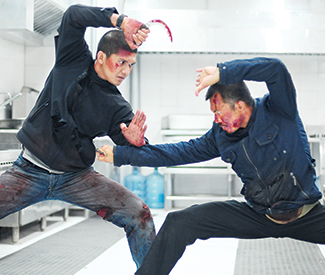

 What began with the FBI investigating a murder and leadership transition in the San Francisco branch of the ancient Chinese organized crime syndicate known as the Triad, led by an undercover FBI agent who had infiltrated the group, evolved into a widening investigation accusing Yee of arranging an illegal arms trafficking deal with a Muslim rebel group in the Philippines in exchange for $100,000 funneled into his campaign, on top of smaller favors that Yee allegedly did in exchange for envelopes with $10,000 in cash.
What began with the FBI investigating a murder and leadership transition in the San Francisco branch of the ancient Chinese organized crime syndicate known as the Triad, led by an undercover FBI agent who had infiltrated the group, evolved into a widening investigation accusing Yee of arranging an illegal arms trafficking deal with a Muslim rebel group in the Philippines in exchange for $100,000 funneled into his campaign, on top of smaller favors that Yee allegedly did in exchange for envelopes with $10,000 in cash.